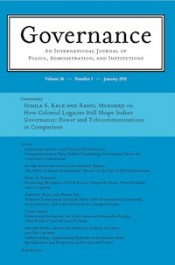Nardulli on “What is governance?”
 Peter Nardulli of the University of Illinois responds to Francis Fukuyama’s “What is governance?”, published by Governance this week:
Peter Nardulli of the University of Illinois responds to Francis Fukuyama’s “What is governance?”, published by Governance this week:
While agreeing with Professor Fukuyama and some of the other commentators, I would add another dimension to the discussion, a methodological dimension. One of the reasons for the abysmal state of most cross-national measures of governance is that few resources have been invested in the creation of the measures. In many instances we “borrow” data collected by someone else for some other purpose and use it as a proxy. We need to move beyond this practice and invest significant resources and the creative use of information technologies in developing conceptually refined and well-grounded measures for a representative set of countries over extended periods of time.
The Cline Center for Democracy at the University of Illinois has committed to several long-term efforts to create governance-related measures. We have assembled teams of researchers and augmented their efforts with various tools that have facilitated their work. Under the auspices of its Societal Infrastructures and Development (SID) project the Center supported the Comparative Constitutions Project, the Legal Infrastructures Project, the Composition of Religious and Ethnic Groups (CREG) project, and the Social, Political and Economic Event Data (SPEED) project, which generates data on civil strife. Much of this work has been accomplished working with personnel from our National Center for Supercomputing Applications (NCSA). At a minimum these projects generate refined data for 165 countries in the Post WWII era. The results of one long-term effort to create a set of rule of law measures appeared in the first edition of the Journal of Law and Courts. The project integrated centuries of data on programs of legal education, legal periodicals and constitutional provisions into a pair of legal order measures for the period from 1850 to 2010.
Peter F. Nardulli, professor of political science and law and director for the Cline Center for Democracy, has served as head of the Department of Political Science within the College of Liberal Arts and Sciences at the University of Illinois since 1992. He is co-author, with Buddy Peyton and Joseph Bajjalieh, of “Conceptualizing and Measuring Rule of Law Constructs, 1850–2010,” in the current issue of the Journal of Law and Courts.
